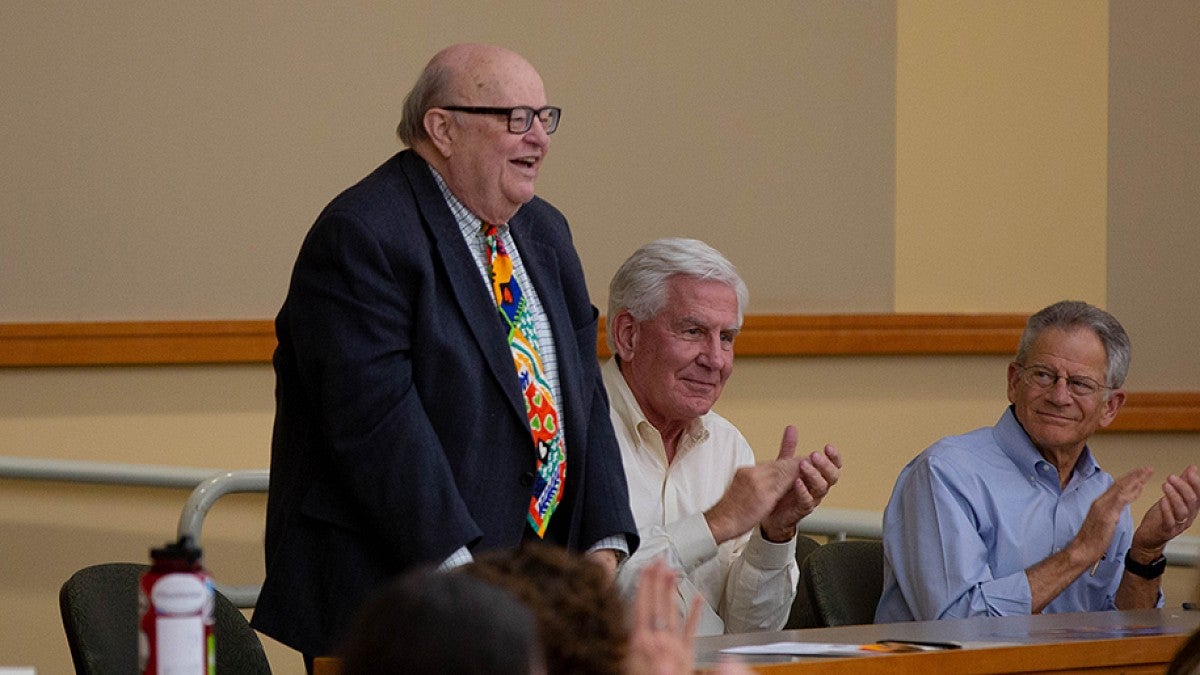Rennard Strickland, former University of Oregon School of Law dean, passed away Jan. 5 in Norman, Oklahoma. He was 80 years old.
Strickland served as dean from 1997 to 2002 and on the faculty until his retirement in 2006. He was Osage and a citizen of the Cherokee Nation and considered a national leader in Indian law who strongly supported the incorporation of Indian law courses into the School of Law curriculum and taught a popular seminar on Indian law and policy. Most recently he was the senior scholar in residence at the University of Oklahoma Law Center.
“I met Rennard when I began my journey into academia nearly two decades ago and then was thrilled to grow closer to him in the past few years as the dean of Oregon Law,” said Marcilynn A. Burke, current dean and Dave Frohnmayer Chair of Leadership and Law. “He was an inspirational and generous soul with a great sense of humor.”
Part of Strickland’s legacy at the UO School of Law is the annual Rennard Strickland Lecture. The Native Environmental Sovereignty Project, a project of the law school’s Environmental and Natural Resources Law Center, created the lecture series to examine Native leadership in the 21st century. It is co-sponsored by the Wayne Morse Center for Law and Politics.
The lecture series is inspired by Strickland’s work, finding particular significance in the following passage from his book, “Tonto’s Revenge”: “If there is to be a post-Columbian future — a future for any of us — it will be an Indian future."
Strickland also helped found the Wayne Morse Center for Law and Politics in 2000, along with Margaret Hallock and UO President Dave Frohnmayer. He also guided the Wayne Morse Center in planning its 2005-07 theme of inquiry, "Indigenous Peoples: National Policy and International Human Rights," although he was no longer dean at the time.
Strickland had a remarkable professional career. He wove together a history of achievement as a dean, law professor, legal historian and art collector. As a preeminent scholar and author in the field of Native American law, he published more than 47 books and 208 essays, articles and book chapters. He acted as editor in chief of the 1982 revision of Cohen’s Handbook on Federal Indian Law and was a member of the editorial board in the 2005 revision.
“Rennard has been our visionary, our statesman, our wise elder and our chief, and he will always have our gratitude for all that he has given us,” said Mary Wood, Phillip H. Knight Professor of Law and faculty director and Environmental and Natural Resources Law Center. “He has left a profound legacy for us to carry on.”
A legend in the field of legal education, he served as the dean at four law schools: the University of Tulsa, Southern Illinois University, Oklahoma City University and the UO. Strickland was the first and only person to have served as both the president of the Association of American Law Schools and as the chair of the Law School Admissions Council.
He also served in a leadership role in the Society of American Law Teachers. He is the only person to have received both the Society of American Law Teachers Award, in 1979, and the American Bar Association's Spirit of Excellence Award, in 1997.
Howard Arnett, professor of practice at School of Law, adds, “As Native American himself, Strickland served as a role model and inspiration to the legion of young Native American lawyers who now practice in the field and who teach Indian law at law schools across the country.”
Strickland earned his bachelor’s degree at Northeastern State University before getting his law degree from the University of Virginia, a master’s degree from the University of Arkansas, and a Doctor of Juridical Science degree from the University of Virginia.
After graduation, Strickland joined the faculty of the University of Arkansas School of Law and following that taught law at St. Mary's University, the University of Tulsa, the University of West Florida, the University of Washington and the University of Wisconsin. In 1985 he became dean at the Southern Illinois University School of Law, and from 1990 to 1995 he served as director of the Center for the Study of American Indian Law and Policy before becoming a professor at the University of Oklahoma College of Law.
Strickland is survived by his sister, Janet Stickland-Gambill, and her husband, Maj. Gen. Bradley Gambill; a niece and nephew; and one grand-niece and three grand-nephews. He was preceded in death by his parents, Ruel James Strickland and Adele Tucker Strickland; and his brother, William M. Strickland. Friends are asked in lieu of flowers to make a contribution to either the Fred Jones Jr. Museum at the University of Oklahoma or Western Spirit: Scottsdale’s Museum of the West in Arizona.
The law school has established a tribute page on the school’s website. Remembrances or thoughts can be sent to lawnews@uoregon.edu. See also an obituary on the Moore Funeral and Cremation website.


